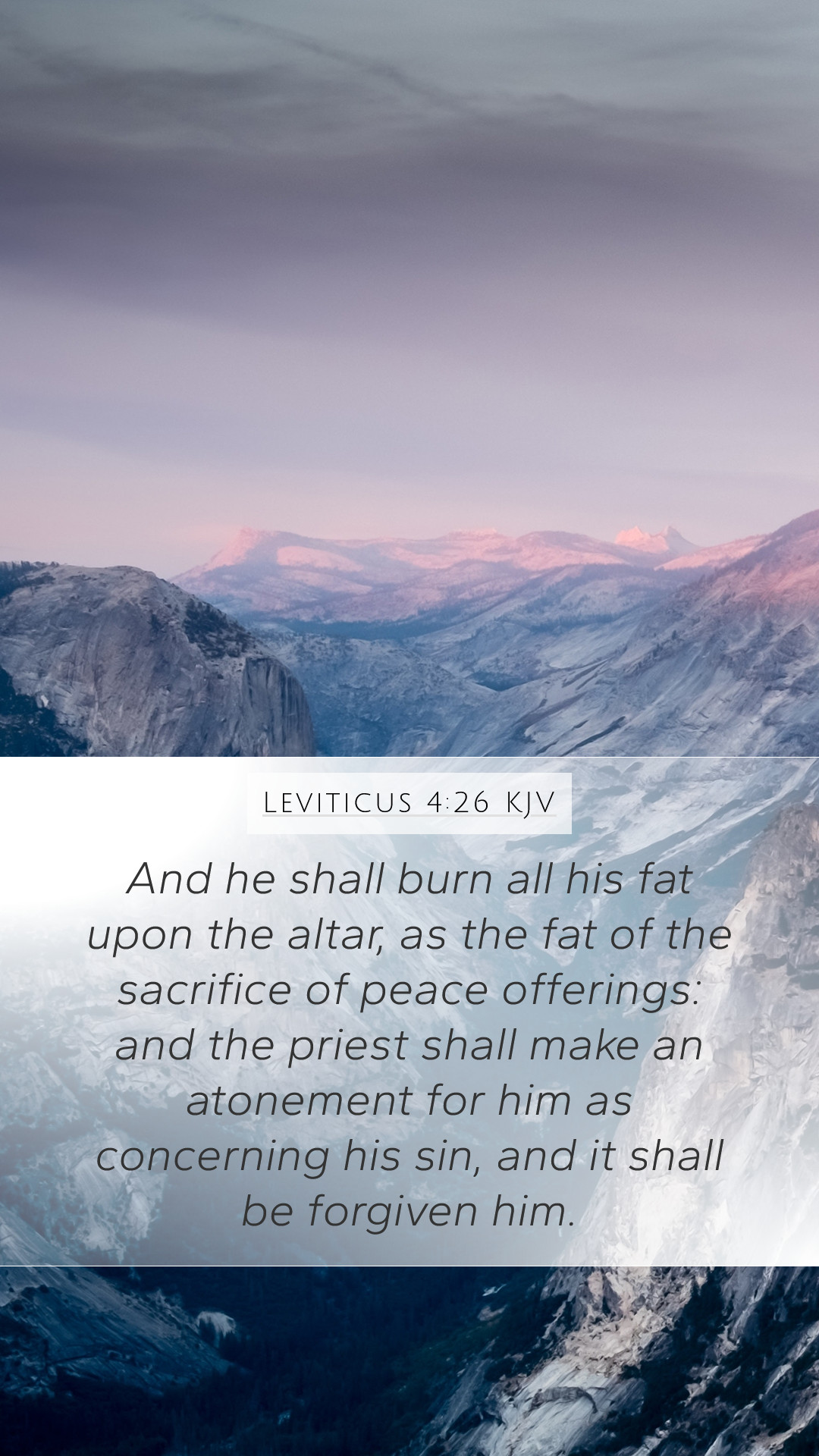Understanding Leviticus 4:26
Leviticus 4:26 states: "And all its fat he shall remove, as the fat of the lamb is removed from the sacrifice of the peace offerings; and the priest shall burn it on the altar for a pleasing aroma to the Lord. And the priest shall make atonement for him, and he shall be forgiven."
This verse is part of the sacrificial laws provided to the Israelites, illustrating the seriousness of sin within the community and God's method of offering forgiveness. Here, the emphasis is on the procedure involved in making a sin offering.
Overall Significance
Leviticus 4:26 encapsulates several key biblical themes including atonement, sacrifice, and the necessity of ritual purity. The removal of fat during the sacrificial process highlights the separation of what is dedicated to God from what is kept for personal use.
Bible Verse Interpretations
-
Matthew Henry Commentary:
Henry emphasizes that the fat represents the best part of the animal, which is to be devoted to God. This signifies that any offering must be made in purity and dedication. The act of burning the fat symbolizes the sweet aroma of the sacrifice that is pleasing to God.
-
Albert Barnes Commentary:
Barnes notes that the act of the priest making atonement provides reassurance that forgiveness is accessible through these rituals. It reflects God's mercy towards sinners who repent and seek reconciliation.
-
Adam Clarke Commentary:
Clarke highlights the procedural aspects of the offering, explaining that God’s instructions were meant to guide the people in their worship. The specificity of the ritual serves to show the importance of adhering to God’s commandments, reinforcing that while sin brings separation from God, there is a divinely appointed way to restore that relationship.
In-Depth Analysis
The sacrificial system set forth in Leviticus was intricate and far-reaching, serving both as a means of worship and a means of social and community law. Leviticus 4:26 presents the priest's role in facilitating the ritual of sacrifice—a pivotal function intended to symbolize the community's need for atonement for their collective and individual sins.
Theological Implications
The verse serves as a precursor to understanding New Testament teachings about sacrifice, particularly the ultimate sacrifice made by Jesus Christ. The act of atonement in Leviticus reflects the deep need for restoration between humanity and God, a theme prevalent throughout Scripture.
Practical Application
Understanding Leviticus 4:26 can inform modern believers about the weight of sin and the grace of God's provision for forgiveness. The principles behind these sacrifices encourage individuals to consider their own lives in light of God’s standards and the importance of repentance and sincerity in worship.
Related Bible Cross References
- Leviticus 1:9 - Discusses the offerings made to the Lord.
- Hebrews 10:4 - Clarifies the impossibility of animal sacrifices fully accomplishing atonement.
- Romans 12:1 - Encourages believers to present their lives as living sacrifices.
- 1 Peter 1:19 - Talks about the precious blood of Christ as a sacrifice.
- Isaiah 53:5 - Prophetic reference to the suffering servant who bears our iniquities.
Conclusion
Leviticus 4:26 stands as a reminder of God’s holiness and the elaborate measures He provided to restore a right relationship with His people. Analyzing this verse through the lens of biblical exegesis allows for a deeper appreciation of the semantic richness of Scripture and its applicability in our lives today.
Bible Study Resources
For those seeking further understanding of this verse and others, consider utilizing various Bible study tools and Bible study guides. Engaging in online Bible study or joining Bible study groups can also enrich one’s understanding of Bible verse meanings.


